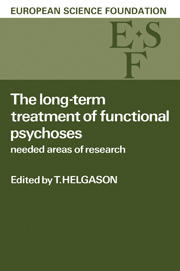Book contents
- Frontmatter
- Contents
- List of Participants
- Introduction
- I Organisational Aspects of Long-term Treatment
- II Patients Aspects of Long-term Treatment
- III Public Health Aspectsof Long-term Treatment
- Introduction to public health aspects of chronic illness and long-term treatment
- Evaluation of long-term community care for patients with schizophrenia
- Case registers for monitoring treatment outcome in chronic functional psychoses
- Socialdisabilityand chronicmentaldisorder
- The neglect of the patient with chronic functional psychosis: the need for further research
- Suicidesand functional psychoses
- Interaction with families
- Cost-effectiveness analysis
- Consumption of services-European aspects
- Index
Case registers for monitoring treatment outcome in chronic functional psychoses
from III - Public Health Aspectsof Long-term Treatment
- Frontmatter
- Contents
- List of Participants
- Introduction
- I Organisational Aspects of Long-term Treatment
- II Patients Aspects of Long-term Treatment
- III Public Health Aspectsof Long-term Treatment
- Introduction to public health aspects of chronic illness and long-term treatment
- Evaluation of long-term community care for patients with schizophrenia
- Case registers for monitoring treatment outcome in chronic functional psychoses
- Socialdisabilityand chronicmentaldisorder
- The neglect of the patient with chronic functional psychosis: the need for further research
- Suicidesand functional psychoses
- Interaction with families
- Cost-effectiveness analysis
- Consumption of services-European aspects
- Index
Summary
Introduction
A register is simply a collection of persons or things with common characteristics. Thus the Villa Lante, the Palazzo Farnese and the Palazzo Barberini are Italian buildings of architectural and aesthetic merit. They, therefore, may appear in a register or list of buildings worthy of preservation.
In a more medical context, cancer registers, registers of congenital malformations, twin registers and adoption registers have been established to further our knowledge of the incidence, prevalence and origins of disease.
Psychiatric case registers
Psychiatric case registers have the common characteristic that they gather information on persons who have received treatment for psychiatric illness. In practice, however, this usually means patients who have received treatment only by the psychiatric services. So psychiatric case registers do not include patients who have consulted general practitioners or other medical or social agencies because of psychiatric complaints, nor do they contain individuals who, although psychiatrically ill, have not contacted any services.
However, the title case-register has a specific connotation which goes beyond a mere listing of individuals. It implies the establishment of a continuing record of a person's contact with the psychiatric services once he has entered the network. The case register system must therefore accumulate over time longitudinal information on individual patient careers. Furthermore this longitudinal information can be obtained by a mechanism of linking the individual spells of contact of the same individual within the same service or between different services. The recognition of the same individual at multiple points of contact and at different periods of time is technically brought about by use of his personal number, in countries where this exists, or by other identifying data in sovereignties where no personal number exists. In this latter case, linkage will be dependent on the acquisition of accurate data on names, including maiden name in the case of married women who have changed their birth names, date of birth, place of residence and so on.
Another essential element of a case register is that it acquires information on individuals who live within a defined population or catchment area. All reasonable efforts are undertaken to obtain information on individuals resident in the catchment area but consulting services outside it.
- Type
- Chapter
- Information
- The Long-Term Treatment of Functional PsychosesNeeded Areas of Research, pp. 197 - 206Publisher: Cambridge University PressPrint publication year: 1985



